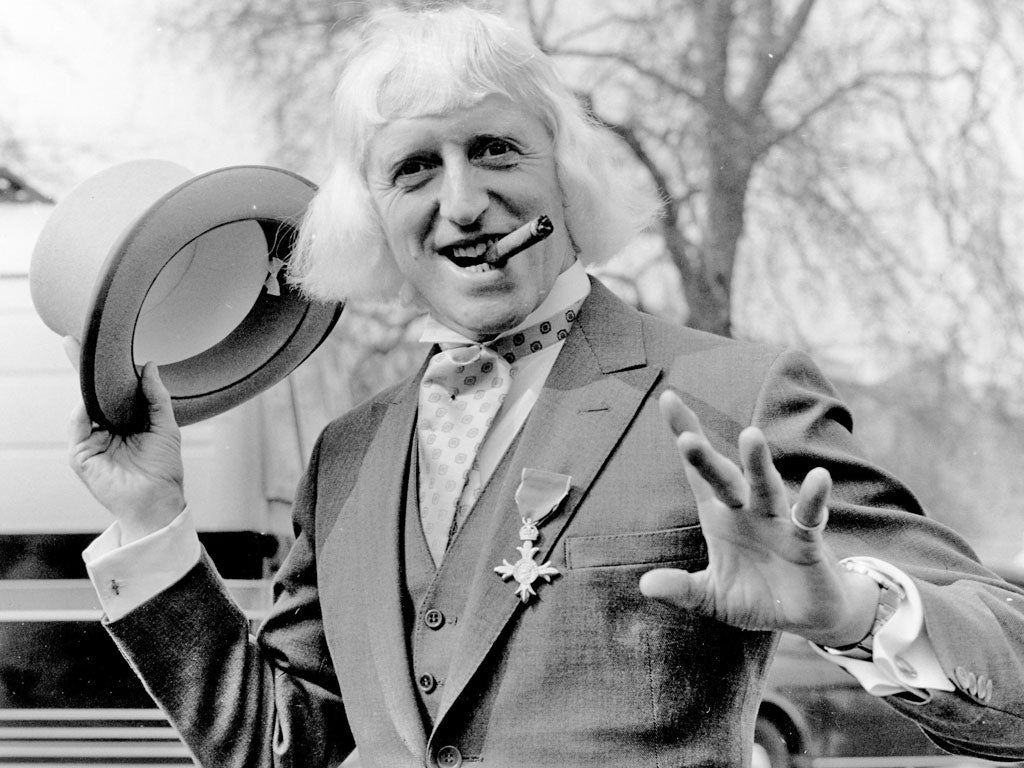"Exposure: The Other Side of Jimmy Savile": now the spotlight is on those who turned a blind eye
Our critic reviews the ITV programme last night that has generated so much news this week, with allegations of systemic child abuse over decades

Your support helps us to tell the story
From reproductive rights to climate change to Big Tech, The Independent is on the ground when the story is developing. Whether it's investigating the financials of Elon Musk's pro-Trump PAC or producing our latest documentary, 'The A Word', which shines a light on the American women fighting for reproductive rights, we know how important it is to parse out the facts from the messaging.
At such a critical moment in US history, we need reporters on the ground. Your donation allows us to keep sending journalists to speak to both sides of the story.
The Independent is trusted by Americans across the entire political spectrum. And unlike many other quality news outlets, we choose not to lock Americans out of our reporting and analysis with paywalls. We believe quality journalism should be available to everyone, paid for by those who can afford it.
Your support makes all the difference."I'm afraid the jury isn't out any more," said a distressed Esther Rantzen towards the end of last night's Exposure: The Other Side of Jimmy Savile, an ITV investigation into allegations of abuse by the disc jockey.
She had been making the point that this was a trial without a defence lawyer, but her demeanour suggested that she thought it would have been an impossible brief if there had been one.
The witnesses, she said, were too matter-of-fact, too consistent with each other, too clear in their memories of what had occurred. I suspect most viewers will have agreed.
And it wasn't just Savile that was in the dock but a set of social attitudes that now looked irresponsible at best, complicit in abuse at worst. "We all colluded with this, didn't we?" asked Rantzen. "We made him into the Jimmy Savile who couldn't be touched." Given what we'd heard about his pawing eagerness to be touched it was an unfortunate phrase. But the charge stuck.
The testimony of those who said they had been Savile's victims was grim enough – very credible accounts of star-struck children coaxed and pressed into escalating and uninvited sexual contact. And Savile's life-long willingness to gurn and leer at any camera nearby had provided the film's makers with a limitless supply of visual aids to help us reconstruct these scenes in the mind.
"Did he touch you intimately?" asked Mark Williams-Thompson, the former policeman who has spent a year researching the story. As his interviewee answered, you saw Savile, his eyes rolling in that cartoonish mask of lubricity behind which he concealed the real thing.
These girls either feared that they wouldn't be believed if they told – or had discovered for certain that they wouldn't be. One of those who complained about being touched by Savile during his regular visits to Duncroft Manor (an approved school which he seems to have treated as a private bordello) had been put in isolation and told she couldn't come out until she retracted her "filthy" accusations.
Savile's carefully groomed image as a mascot of do-goodery made it almost inconceivable that he might be doing very bad things indeed. But almost more shocking was the evidence of the men who'd actually seen this happening.
Wilfred De'ath, then a young BBC producer, stumbled through an account in which self-contradiction followed self-contradiction. "It was all hearsay," he said about the gossip, but then added: "He never attempted to hide this predilection."
One of the people Savile didn't hide it from, it became clear, was Wilfred De'ath, who found himself out on the town with Savile and a 12-year-old girl. The next day, when he phoned Savile in his hotel bedroom, it became clear the girl had spent the night with the DJ. De'ath seemed more disturbed that he had been required to make small talk with a child, than by the fact that a BBC star might have committed statutory rape. He didn't report it, he said, because "I wasn't a very strong person".
Alan Leeke, a Manchester-based journalist who went to interview Savile at his home on one occasion, didn't report it either. He said he saw Savile emerge from a bedroom to casually rinse himself down, having just had sex with a teenage girl. Leeke left soon afterwards. "I hadn't got a story," he said. "It was pretty plain he didn't want me there."
That extraordinary line – "I hadn't got a story" – was perhaps most telling of all. The crime was effectively invisible because no one cared to make a fuss. And that made Savile so confident he hardly bothered to hide. Well it's a story now, and a very convincing one, too.